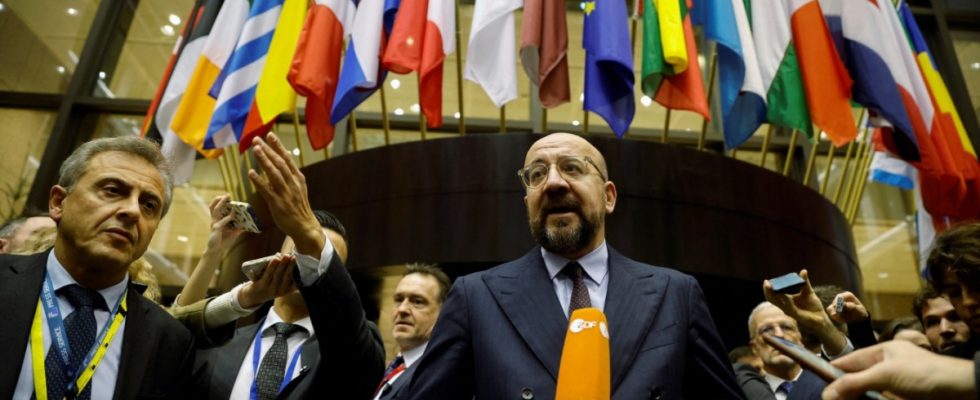The heads of state and government of the European Union decided at their summit on Thursday in Brussels to begin formal accession negotiations with Ukraine. EU Council President Charles Michel announced this in the evening. Accession talks should also begin with Moldova. The “historic” decision is “a clear sign of hope” for the populations in the countries, said Michel.
Ukrainian President Volodymyr Zelenskiy, who was present at the summit via video and vehemently promoted the decision, reacted immediately: “I would like to thank everyone who worked to make this happen and everyone who helped with it,” he wrote at X.
The way out of the dilemma was diplomatically elegant – and very European
With the decision, the EU narrowly avoided a diplomatic debacle. Just a few hours earlier, it had looked as if Hungarian Prime Minister Viktor Orbán could single-handedly block the opening of accession negotiations. In doing so, he would not only have gone against the EU Commission, which recommended this step a few weeks ago. He would also have prevented a decision that all remaining 26 EU governments absolutely wanted, he would have broken the EU’s previous unity in the Ukraine conflict, he would have massively duped Ukraine, and given Russian President Vladimir Putin a political victory – and himself isolated in the EU on an extremely important issue.
Apparently Orbán doesn’t want to go that far. However, after he had publicly emphasized in recent weeks – and on Thursday morning when he arrived in Brussels – that accession talks with Ukraine were premature and that he would not change his mind, he could not simply change course.
The way out of the dilemma was diplomatically elegant – and very European. According to reports, the procedure was largely devised by Chancellor Olaf Scholz, in coordination with Michel: Orbán left the room for a few moments during the deliberations without appointing a colleague to represent him. The 26 remaining heads of state and government were then able to unanimously approve the passage in the summit document according to which the EU decided to open accession talks with Ukraine and Moldova. Then Orbán returned to the meeting room. EU diplomatic circles said that Orbán’s absence had been “discussed in advance and constructive”.
Orbán himself confirmed this face-saving procedure, which saved him an abstention or a veto, a short time later at X. He called the start of accession talks with Ukraine “a bad decision” and added: “Hungary did not take part in this decision .” According to EU officials, the procedure is legal – the decision was adopted by the Council of Heads of State and Government without any objection from any member state.
“It is important to us that we now set the course that will advance the accession process.”
Before the summit began, all heads of state and government had made it clear to Orbán that they wanted to decide to open accession talks. Ukraine still has to fulfill a few final conditions before the talks actually begin. The EU Commission will present a further balance sheet on this in March. But the EU’s fundamental political commitment to the negotiations should, according to the will of most Union members, be dropped at the December summit. “It is important to us that we now set the course that will advance the accession process here in Europe and that this is also a decision that is supported by all member states,” said Chancellor Scholz before the summit began.
On Thursday morning, Scholz, together with French President Emmanuel Macron, EU Council President Michel and EU Commission President Ursula von der Leyen, took Orbán aside and urged him to give in. At first it didn’t look as if the meeting would be successful – Orbán maintained his negative attitude, at least in his public appearance. A few hours later, the agreement came as a complete surprise.
On Thursday evening, Orbán remained stubborn about future financial aid for Ukraine. He continued to reject the plan, supported by all EU countries, to save Ukraine from bankruptcy in the next four years with 50 billion euros from the EU budget – including 33 billion euros in loans and 17 billion euros in grants. However, if necessary, the other member states can raise the money outside the EU budget without Hungary.

